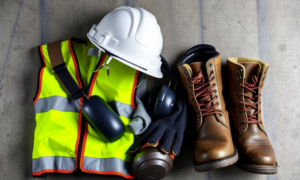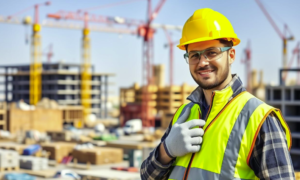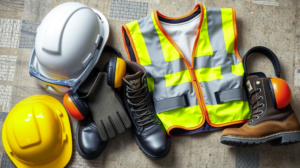Key Takeaways Construction Safety Gear
Construction Safety Gear mirrors the many hazards present in traditional work settings such as falling objects or hazardous chemicals.
The importance of personal protective equipment (PPE)
Proper selection and maintenance of safety equipment is key to keeping a safe workplace that meets OSHA standards.
The importance of safety gear and legal requirements also helps employees to make better decisions.
Companies seek to remain competitive, so updating their safety gear to the most current level of protection and practices keeps everyone safe… and working.
Construction Safety Gear Saves Lives!
Understanding the Risks
Workspaces are dangerous places The hazards of welding are numerous and can injure workers. This creates risks like falling objects, electrical risks and dangerous substances. Finally, do not overlook the value of safety gear to prevent harm among all workers. The Occupational Safety and Health Administration (OSHA) standards require this as well. Realizing the Hazards Construction websites can always be dangerous. Some of that include: Object falling tools, materials or debris from high places Dangerous currents live wires and broken equipment Exposure to hazardous substances asbestos silica powder dangerous chemical Slip trip fall on uneven surfaces spills Heavy machinery vehicles accident.
Legal Requirements
Fall protection in general is regulated per the guidelines of Occupational Safety and Health Administration (OSHA) which has a list of rules for diver safety gear. Workers have the right to receive protective equipment and employers must ensure it is worn correctly. Non-compliance with OSHA sometimes carry severe punishments like hefty fines and criminal charges. Construction companies save money on damaged goods the their workers life by following the law and making sure they are safe. Workplace safety is not optional — it’s the law and an ethical responsibility. Buying better construction safety gear is a small cost if it assures that workers will be save! ConstructionSafety Gear Basics
Construction sites can be dangerous places. But, with the right safety gear, workers can stay safe. We’ll look at the key safety equipment every worker needs. This includes hard hats, safety glasses, work boots, and more.
Hard Hats: Head Protection
Construction workers must have hard hats. They prevent injuries from falling objects and impacts to the head. Ensure your hard hat has a tough shell, adjustable straps and chin strap for the right fit.
Work Boots: Foot and Ankle Protection
Dust and debris can scratch your eyes, in construction areas that are so dustycluttered. Safety glasses with side shields or goggles to protect your eyes. Opt for goggles having side shields as it will act like barrier fencing.
High-Visibility Clothing: Increased Visibility
Reflective clothing: Wearing high-visibility reflective vests and reflecting jackets helps a lot. This is significant in busy work places. It reduces the chances of accidents by making you noticeable to others.
Fall Protection Equipment: Safeguarding against Heights
Fall protection gear is the most critical part of height for workers The correct reference includes harnesses, lanyards and anchorage points. These can help to prevent the falls or reduce, if it occurs.
Hand Protection: Guarding Against Cuts
Head: Since head is property in construction, hence it needs to be protected. Another Safety Basic — Construction work is dangerous, and workers need protection from falling debris and objects flying about. One of the most critical ways to provide that sort of safety for site construction crews is a hard hat as in worn by Reds’ pitcher Luis Castillo here early this spring in Goodyear AZ / Image: Mark Sheldon via Twitter These helmets strategically give on impact to save the head from any blows. Marketplace helmets come having suspension systems, and ventilation parcels etc. This will improve comfort and reduce fatigue. For this reason you should ensure that the hard hat fits and meets ANSI Z89. The technology complies with Tier 1 standards in certificate renewal practices that maximise security.
| Safety Gear | Purpose | Key Features |
|---|---|---|
| Hard Hats | Head protection against falling objects, impacts, and overhead hazards | Sturdy shell, adjustable suspension system, chin strap |
| Safety Glasses | Eye and face protection from debris, dust, and flying particles | Impact-resistant lenses, side shields |
| Work Boots | Foot and ankle protection against heavy objects, sharp materials, and slippery surfaces | Steel toe, slip-resistant sole, ankle support |
| High-Visibility Clothing | Increased visibility to heavy machinery operators and other workers | Reflective vests or jackets |
| Fall Protection Equipment | Safeguarding against falls from heights | Harnesses, lanyards, anchorage points |
| Hand Protection | Protection against cuts, abrasions, and other hand injuries | Durable work gloves |
Construction Safety Gear
Head Protection
Head: as it plays a vital role in construction so needs to be protected. One of the most important items required for construction is a hard hat to protect workers from falling debris and other objects. These helmets are designed to absorb impact, providing protection for your head. Helmets available in the market have suspension systems, and ventilation etc. These improve comfort and will keep fatigue from setting in. Because of this, you should be sure your hard hat fits and complies with ANSI Z89. 1 standards for the best protection.
Eye and Face Protection
Why Do Your Eyes And Face Need Protection? Safety glasses, face shields or welding helmets are all obligatory items. Goggles protect the eyes from debris while face shields cover your whole face. Welding helmets are important for welding. These are popular because with the help of auto-darkening filters they can fit shades correctly and give you practicality in vision as well providing protection. Construction worker with yellow hard hat protecting Personal Protective Equipment in work at Construction site industry under construction cranes background, blue sky building process concepturi One of the most important accessories available for ensuring your safety while working on construction sites is a hard hat and how to choose the safe impact protection, face shields, goggles, and welding helmets. Also assures that workers remain safe from hazards at construction sites.
| Safety Gear | Key Features | Protection Provided |
|---|---|---|
| Hard Hats | Impact-resistant shell, suspension system, ventilation | Head protection against falling objects and impact |
| Safety Glasses | Impact-resistant lenses, side shields | Eye protection from debris and flying objects |
| Face Shields | Clear, transparent polycarbonate panel | Face protection from splashes, sparks, and other hazards |
| Welding Helmets | Auto-darkening filters, adjustable shade levels | Eye and face protection during welding operations |
Choosing the Right Gear for Your Job
Safety Equipment According to Occupation Personal protective equipment (PPE) — literally, learn which one you need for your role. Think about the dangers you are likely to experience and what will keep you safe and warm.
Assessing Job Hazards
First, do a hazard assessment. Look for risks like falling objects, sharp edges, or dangerous materials. Use OSHA guidelines and industry tips to spot these hazards.
Selecting Appropriate Personal Protective Gear
Identify the dangers, and then select your safety gear. Safety To be worn when necessary, such as hard hats, safety glasses or gloves. The important thing is to ensure your gear fits well, and possibly most importantly feels comfortable
| Safety Gear | Potential Hazards Addressed |
|---|---|
| Hard Hat | Falling objects, bumps, and impact |
| Safety Glasses | Flying debris, dust, and chemical splashes |
| Gloves | Cuts, abrasions, and chemical exposure |
| High-Visibility Clothing | Struck-by incidents, poor visibility |
| Steel-Toed Boots | Falling objects, punctures, and slips |
Proper Use and Maintenance of Safety Gear
Construction safety gear helps in protecting your skin and reduces the physical stress of work, so knowing proper use and upkeep is a must. It is also extremely critical to check the condition of your safety gear regularly and maintain them as per manufacturer guidelines. They help maintain your equipment as well as make sure that it is capable of meeting OSHA compliance.
To keep your safety gear in top condition, follow these tips:
Check your gear before each use. Look for wear, tear, or damage that could harm its protection.
Clean your equipment as the manufacturer instructions say. This keeps it in good shape and lasts longer.
Store your safety gear right when not using it. Keep it in a cool, dry spot, away from sunlight or harsh weather.
Swap out any worn or broken parts right away. Don’t risk using safety gear that’s not up to par.
As long as you follow manufacturer guidelines and OSHA regulations, focus on equipment care —your safety gear will continue to protect. The inspection and maintenances of regular safety gear are important steps that ensure a secure work place. The purpose of this article is to urge you to undoubtedly coddle that safety gear the next time your considering turning back for shore over a pair of flippers.
Conclusion
In the construction world, keeping workers safe is very Important. Using the right safety gear prevents injuries and meets OSHA rules. It’s important to use and care for safety equipment well.
Keeping workers safe is a must, not just a law. Knowing the risks and choosing the right safety gear shows a real care for workers. This makes the job safer and more productive for everyone.
Change is constant in construction. At the same time, new rules and safety gear are inevitable. When workers are healthy, they can perform better and focus on safety. This means the entire industry is much stronger and more trustworthy.
Frequently Asked Questions (FAQs)
What are the key types of construction safety gear?
Must have line crew safety gear: hard hat, shades and work boots. As well, visibility-clothing, fall-protection and hand protection are important.
Why do construction safety gear matters?
Construction sites are full of hazards, including falling debris and electrical dangers. Another example is safety gear to protect workers from any type of harm and keep them away.
What are the legal requirements for construction safety gear?
OSHA rulings dictate the types of safety equipment that must be used on a construction site. This gear must be supplied by employers and maintained in their good condition.
How do I choose the right safety gear for my job?
Safety equipment for YOUR job Knowing your work environment and the way that you feel comfortable in performing it. This making sure it is the right size and feels good.
How do I properly use and maintain my safety gear?
Safety gear is only effective if used and maintained properly. Scrub, rinse and store it appropriately. Abide by the manufacturer’s requirements and follow OSHA rules to maintain it properly.
What are some common construction site hazards that safety gear can protect against?
At construction sites one can fall victim to harmful accidents and the object might fell down or electrical hazard because of use it not properly. Wearing safety gear is a way to keep workers safe from these hazards. Prevents Injuries or Illness
How can construction safety gear help promote a culture of safety on the job site?
With quality safety gear and the proper knowledge of when to use them, your workplace becomes significantly safer. This creates a safety-first culture. By addressing risks, employees are kept safe, and this is proof of the team’s commitment to safety.
QTM High Visibility Protective Safety Reflective Vest Belt Jacket




